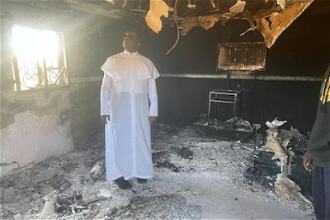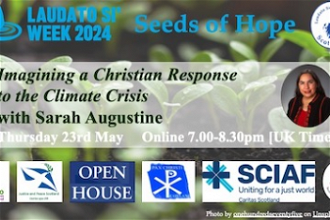London: forum calls for greater support for Catholics in China
Catholics in the UK must support their counterparts in China by building closer personal relationships, members of the Cultural Exchange with China group heard on Saturday. A strategy was needed for "linking parish to parish, diocese with diocese and maybe individual with individual", Raymond Traynor told the group, a voluntary association which focuses on raising awareness in the Catholic Church in Britain about China, at its fifth annual general meeting held at Vaughan House, in Victoria, at the weekend. He stressed the need to "improve mutual understanding in the limited way we can". More than 60 people, many with long-standing connections with China, listened to presentations on aspects of Chinese society and discussed the role Catholics can play in building bridges between Britain and China, at the meeting. The group included four teachers preparing to travel to Chinese cities to spend a year on a teaching placement. Debate also focused on the serious problems facing Catholics in China, including state tolerance of religious practices and the complexity of the relationship between the state-sanctioned registered church and the 'underground' non-registered Church. China, which is believed to have ten million Catholics in its 1.2 billion population, has 70 bishops in the registered church, 39 in the non-registered church and 20 of uncertain status. Fr Eamonn O'Brien, who spoke vividly of his recent visits to Catholic communities in China, said he was "optimistic" that China was moving towards a greater openness of religious expression. "I would like to think that the church is coming out of the ghetto," he said. To echo this, Dr Traynor pointed out that the birthday of Confucius had been celebrated officially this year for the first time in the 56 years since the Communist revolution, signifying an increased state openness to a variety of religious celebrations. In the afternoon, two guest speakers expanded on the social problems facing China that are increasingly relevant to the work of the church in Chinese communities. Professor Leo Goodstadt, former chief policy adviser to the Hong Kong government under the governorship of Christopher Patten, spoke incisively about the vast social inequalities that are arising as China's rapid economic growth takes its toll on communities. He spoke of the social disruption to rural areas as migrants travel to China's ever-growing urban centres to provide cheap labour. Rural areas are losing 20% of their young people who leave for rootless and insecure lives in urban areas, providing cheap labour for which they are often paid months or years in arrears. The People's Republic's one-child policy, by which most families are restricted to raising one child, had also contributed to the breaking down of the traditional social structures that form the basis of Chinese society, he said. Where in the 1970s the average number of children in a Chinese family was 5.8, it is now 1.8, and the Chinese government has to address the attendant problems of providing for the elderly in a society with a dwindling core of younger workers. Dr Maura O'Donohue, Medical Missionary of Mary, an expert in the field who has worked on CAFOD's HIV/AIDS projects for ten years, continued this theme in her talk on the growth of HIV/AIDS and the trafficking of women, referring to Anti-Slavery International's publication An Absence of Choice, which reports on how some of the young bachelors have attempted to "purchase their wives" from neighbouring North Korea. The trafficking of women, both from and within China, feeds into China's growing problem with HIV and AIDS, she said, in a context where "HIV compounds the problems of poverty". Dr O'Donohue stressed how the associated problems of stigma, denial and fear were issues with which the church could help. Catholic social service centres were linking up the response to trafficking and HIV, she said. But it isn't necessary to travel to Shanghai or to Xian to make a contribution, agreed the group. Fr Eamonn O'Brien talked of the importance of making connections with Chinese people living and working in the UK: "Welcome Chinese people," he said. "Invite them in at Christmas and Easter." For further information see: www.cecuk.org


















